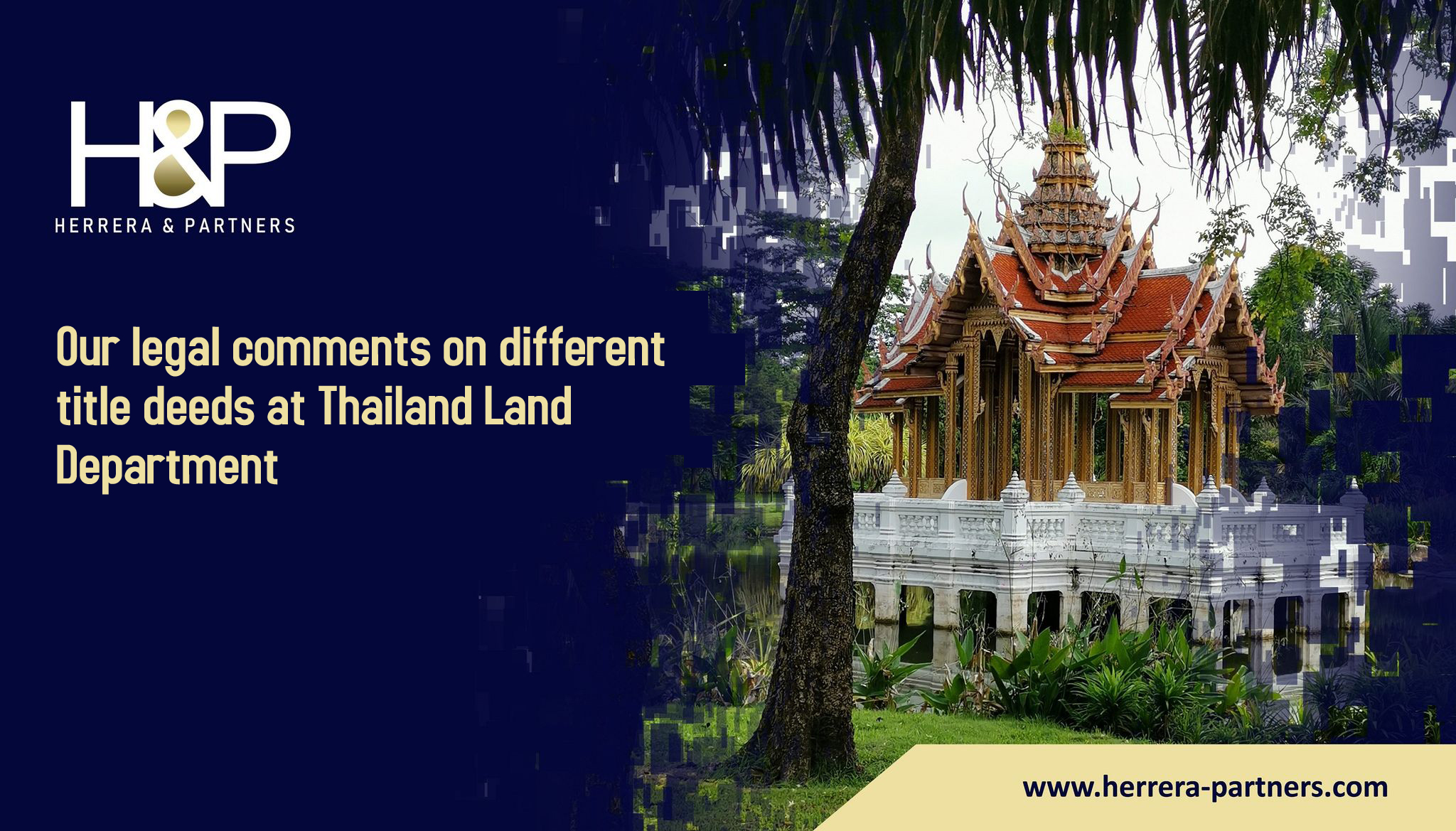
It is commonly known that the ownership of the land is shown by the land deed. The land deed is issued by the Thailand Land Department, which has authority over the land.
Nonetheless, there are many types of the land deed as well. Some of them do not present the ownership over the land as it may only show the possession right. Hence, it is advised to examine the category of the land deed before committing a legal action over such land. H&P lawyers in Thailand have prepared this brief overview of the different categories of deeds issued by the Land Department to bring clarifications on this topic.
Initially, it is mandatory to understand Thai legal concept of possessory right and ownership right. Ownership is the widest right on the property. The owner of the property has the right to use the property as he or she desires and can transferred the land to other persons by selling or any methods of transferring.
On the other hand, the possessory right only allows the right holder to use and possess the property. The possessory right holder cannot transfer the land to other persons. For example, Mr. James lease the land from Ms. Jane. Mr. James have only the possessory right over the land. He can use the land as agreed with Ms. Jane, but he cannot transfer the land to other persons. The possessory and the ownership right can be separated from each other. Having the possessory right does not mean having ownership right and vice versa that is why H&P Bangkok lawyers always advise to conduct a comprehensive legal due diligence on the land ownership.
Categories of The Deed under The Land Department in Thailand
The category of land deed in Thailand is diverse. Each categories have a limitation of their own. It is mandatory to understand each category of the deed before committing a legal action with others. The following is the category of land deed in Thailand:
1. N.S. 4: This deed has a red Garuda symbol at the top of the document. The document illustrates the ownership over the land. This category of the deed is the supreme category of the land deed. It can be sold, possessed, or transferred to other persons.
2. N.S. 3 K: This deed has a green Garuda symbol at the top of the document. The document illustrates as the certificate of utilization. The land, which has this category of the deeds, has been utilized and already has the cadastral map of the land. Because the land has the cadastral map, the land with N.S. 3 K deed can be applied for the N.S. 4 for the ownership of the land if the land meets the requirements of the authorization. Moreover, the land with N.S. 3 K can be sold, possess, or transferred to other persons like N.S. 4 deed.
3. N.S. 3 and N.S. 3 Kh: This deed has a black Garuda symbol at the top of the document. The document illustrates as the certificate of utilization as well. It only certifies the possession on the land without the ownership. However, this category of the deed does not have the cadastral map of the land. Hence, it cannot be transferred to other persons until the cadastral map will be issued.
4. Others: There is the deed with the blue Garuda as well. The deed with blue Garuda illustrates that a person cannot have the ownership over the land and can only have the possessory right. Normally, it is used in agricultural land. The land in this category cannot be transferred except special cases, which the government allows to do so.
Rights over the Land
- Ownership
Ownership is the right according to the law. The owner of a property has the right to utilize, transfer, or obtain the fruit of the property including follow the property to obtain it back and prevent other person from utilizing such property unlawfully. Such definition of the ownership is stated in section 1336 of Thai civil and commercial code.
In other words, the owner can utilize and transfer the property as he or she desire. A person can have an ownership in the land buy many legal actions such as purchase agreement. Nonetheless, other laws may be applied when there is a purchase of the land in Thailand. There is still a restriction for foreigners for purchasing a land in Thailand. The laws still prohibit a foreigner to have the ownership over the land in Thailand except in certain cases.
- Right over Leasehold
Right over the leasehold differs from the leasehold right. Right over leasehold is attached with the property. Although the owner of the property is changed, the right over leasehold on the property will not also change. Unlike lease agreement, the right over leasehold will not be terminated by the death of the renter. The right over leasehold will expire according to the time limitation or the termination of such right. The right over leasehold can be agreed for only 30 years and can be agreed again when the time is due. The right holder can utilize the property as agreed with the owner of the property. Hence, the right holder may utilize the property as if he or she owns the property.
Nonetheless, the right holder cannot transfer the property to other persons since such right is limited for the owner of the property only. The related law on this matter is Right over Leasehold Act, which stated the qualifications for the right over leasehold.
Moreover, please be advised that the land that can have the right over leasehold must be a land that can have the ownership only. In other words, the land must have the title deed with the red Garuda.
- Usufruct
This is a civil law concept that sometimes is not totally understood by our clients who come from Common Law Jurisdictions. There is a legal concept in Thai legal system called “usufruct”. This concept allows a person to possess and manage the land. It also can last for a life-time of the usufructuary. The usufructuary can possess the property and do anything to such property.
However, the usufructuary cannot transfer the property to other persons. This right is limited to the ownership of the property only. Moreover, a usufruct also can be for the life of usufructuary. It is a personal right. So, when the usufructuary dies, the right also ends with the usufructuary. It cannot transfer to the descendants of the usufructuary by inheritance, unlike ownership. There are not any restrictions on usufructuary on the foreigners, unlike ownership. Hence, foreigners can register for usufruct and hold such right.
To conclude, although in most of the cases a foreigner cannot have the ownership of the land in Thailand, there are many alternatives that the foreigner can use to utilize the land. Such alternatives include the lease agreement, the usufruct, or the right over leasehold etc. Nonetheless, the category of the land will be taken into account of the approach that may be applied as well. To examine an applicable approach, it is advised to consult with a legal professional or attorney in Thailand.
If you need a legal consultation on property law in Thailand, please contact our law firm in Bangkok at [email protected]


